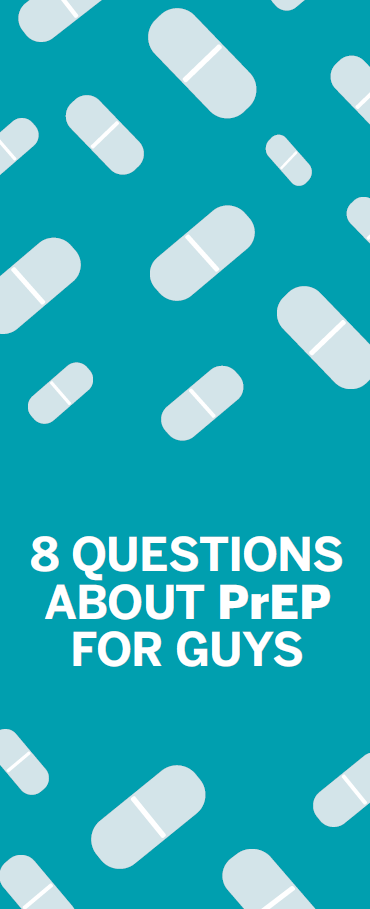1. What is PrEP?
PrEP is used by HIV-negative people to help prevent HIV transmission. PrEP stands for pre-exposure prophylaxis. It involves taking a prescription pill that contains two medications.
Taking PrEP also involves medical visits every three months for HIV testing, screening for other sexually transmitted infections (STIs), monitoring for possible side effects, and ongoing support.
Most guys take PrEP every day, and some take it only on days before and after having sex (this is called on-demand PrEP). You can talk to your doctor about which way might work best for you.
PrEP is one of several highly effective ways to help prevent HIV, and it can be used as part of a healthy sex life. Another highly effective way to prevent HIV transmission is using condoms. Also, when people with HIV take treatment and maintain an undetectable viral load, they do not pass HIV through sex.
PrEP only helps to prevent HIV—it does not protect against other STIs (such as chlamydia, gonorrhea, herpes and syphilis) or other infections (such as hepatitis A, B and C).
2. Who is PrEP for?
PrEP is for HIV-negative people who are at risk for HIV. You might want to use PrEP as a way of staying HIV negative if one or more of the following applies to you:
- You don’t always use condoms for anal sex or vaginal sex.
- You don’t know the current HIV status of one or more of your sex partners.
- You have a sex partner who is HIV positive and who is not on HIV treatment with an undetectable viral load.
Talk to your doctor about whether PrEP is right for you.
3. How well does PrEP work?
For HIV-negative guys who take PrEP as prescribed and who have regular ongoing medical care, it is rare to get HIV through sex.
Taking your pills when you are supposed to is very important because PrEP can be less effective when pills are missed. If pills are missed, drug levels in your body may be too low to prevent HIV infection.
4. Is PrEP safe?
PrEP is generally safe and well tolerated, and most people who take it report no side effects. Some do experience side effects such as nausea, diarrhea or fatigue, but these usually go away on their own within a few days to weeks as the body adjusts to the medication.
Talk to your doctor if you experience any side effects.
In some people, PrEP can affect the kidneys, liver and bones. If this happens, organ function usually returns to normal after PrEP is stopped. Your doctor should monitor your kidney function while you are taking PrEP and check for evidence of other possible drug effects on the body.
5. What else is involved in taking PrEP?
Being on PrEP involves more than just taking pills. Before starting PrEP it is important to be tested for HIV to make sure you’re negative. Starting PrEP if you are HIV positive (but don’t know it) can create serious problems for future HIV treatment.
You will also need to be tested for other STIs and hepatitis B. Your doctor should also test your kidney function.
While taking PrEP you will need medical visits every three months to test for HIV and other STIs, to monitor for drug side effects and to get ongoing support if you need it.
Since PrEP doesn’t protect against STIs, many guys use condoms at the same time as PrEP.
6. What are some other benefits of PrEP?
PrEP has benefits beyond preventing HIV. If you worry about getting HIV during sex, being on PrEP can help you feel less anxious about getting HIV.
PrEP is a way to help prevent HIV that you can control without your sex partner knowing that you are using it.
You can be on PrEP for as long or as short a time as you want. Many guys only use PrEP for a period in their life when they need it, based on their risk for HIV at the time.
7. What about PrEP for trans men?
There is not a lot of information about the effect of PrEP in trans men, but based on what we know from other people, experts think that trans men can use daily PrEP to help prevent HIV.
An on-demand PrEP schedule should not be used by trans men having frontal sex. For these men, it is very important to take PrEP every day and not miss any pills because daily dosing is needed to keep drug levels high in the front hole or vagina.
8. How can I get PrEP?
If you want to take PrEP, you have to talk to a healthcare provider who is licensed to write a prescription.
PrEP medications can be expensive, but cheaper generic versions exist. PrEP may be covered by some private and public health insurance plans in Canada.
You may want to contact your doctor, a sexual health clinic or an HIV organization for help to figure out how you can pay for PrEP.
More information about PrEP in different regions of the country, especially for gay guys and other guys who have sex with guys:
- Get PrEPed by the Health Initiative for Men (HiM) in British Columbia
- The Sex You Want by the Gay Men’s Sexual Health Alliance in Ontario
- HIV now by the AIDS Committee of Toronto in Ontario
- La PrEP by RÉZO in Québec
- PrEP by AIDS Coalition of Nova Scotia
- HIV pre-exposure prophylaxis (PrEP)
If you know of other websites that offer info about PrEP for guys in Canada, email them to info@catie.ca.

